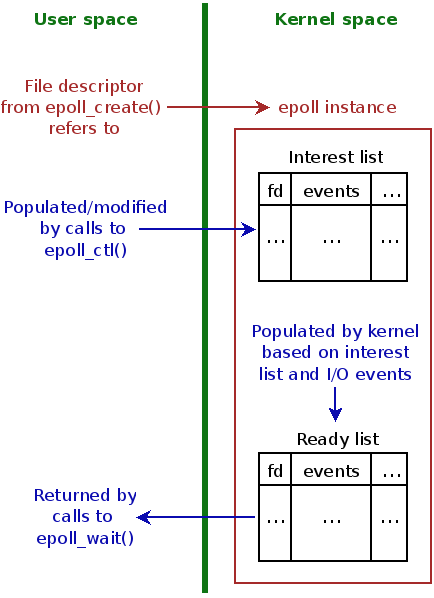- win32汇编环境,网络编程入门之九
一品人家
汇编
;在上一教程里,我们学习了在连接成功网站后,应该发送什么数据给网站;在前面的几个教程里,简单地运行了套接字机制连接网站的方式,这是字节级的网络连接,扩展几乎是无限的。;想了想,这个开个头就行了,暂时放下来,再讲下去越搞越复杂,还是把一些基础运用的方式讲一讲。以后回头再来研究它。;从这个教程开始,讲一下部分微软专用网络API的运用。;微软网络API有2个值得一提,1个是WinInet,还1个是Win
- 探秘高并发网络编程:从基础原理到实战优化
拉姆样子
课程设计
一、引言在当今数字化时代,高并发应用无处不在,从大型电商平台的抢购活动,到热门在线游戏的多人实时对战,这些场景背后都离不开高效的高并发网络编程技术。深入理解高并发网络编程,不仅能让开发者构建出更强大、稳定的应用系统,还能为应对复杂多变的业务需求提供有力保障。接下来,我们将从基础原理逐步深入到实战优化,全方位探秘高并发网络编程。二、基础原理(一)网络通信基础在网络编程中,最基本的概念是套接字(Soc
- 【第21节】windows sdk编程:网络编程基础
攻城狮7号
Windows编程(C++)windowswindows编程windowssdkc++网络编程
目录引言:网络编程基础一、socket介绍(套接字)1.1BerkeleySocket套接字1.2WinSocket套接字1.3WSAtartup函数1.4socket函数1.5字节序转换1.6绑定套接字1.7监听1.8连接1.9接收数据1.10发送数据1.11关闭套接字二、UDP连接流程2.1接收数据2.2发送数据三、阻塞与非阻塞模式四、示例代码4.1TCP协议代码4.2UDP协议代码引言:网络
- 索骥馆-编程语言之《网络编程实用教程(第2版)》扫描版[PDF]
cinnarnia
面壁区windows编程程序设计TCPIP网络
内容介绍:本书主要介绍基于tcp/ip协议栈的套接字网络编程技术。全书分为10章,第1章介绍网络编程基础,第2章介绍套接字网络编程接口,第3章介绍windows环境的网络编程,第4章介绍mfc编程,第5章介绍mfcwinsock类的编程,第6章介绍wininet编程,第7章介绍winsock的多线程编程,第8章介绍winsock的输入/输出模型,第9章介绍http及高级编程,第10章介绍电子邮件协
- 【第22节】windows网络编程模型(WSAAsyncSelect模型)
攻城狮7号
Windows编程(C++)windows网络编程windows编程windowssdkc++
目录引言一、WSAAsyncSelect模型概述二、WSAAsyncSelect模型流程2.1自定义消息2.2创建窗口例程2.3初始化套接字2.4注册网络事件2.5绑定和监听2.6消息循环三、完整示例代码引言在网络编程的广袤天地中,高效处理网络事件是构建稳定应用的关键。WSAAsyncSelect模型作为一种独特且实用的网络编程模型,为开发者提供了异步处理网络事件的有力手段。它巧妙地将Window
- 11.网络编程的基础知识
就很对
网络linux
11.网络编程的基础知识**1.OSI模型与TCP/IP模型****2.IP地址分类****3.Socket编程****4.TCP三次握手与四次挥手****5.常用网络测试工具****6.练习与作业****7.总结**1.OSI模型与TCP/IP模型OSI模型(开放系统互联模型):7层结构:应用层:为网络用户提供各种服务(如HTTP、FTP)。表示层:数据加密解密、压缩解压缩。会话层:管理进程会话
- 使用 libevent 构建高性能网络应用
ScilogyHunter
常见软件库libevent事件驱动软件库
使用libevent构建高性能网络应用在现代网络编程中,高性能和可扩展性是开发者追求的核心目标。为了实现这一目标,许多开发者选择使用事件驱动库来管理I/O操作和事件处理。libevent是一个轻量级、高性能的事件通知库,广泛应用于网络服务器、代理、缓存等场景。本文将详细介绍libevent的核心概念、使用方法以及如何利用它构建高性能的网络应用。1.什么是libevent?libevent是一个用C
- Python程序设计(入门)
xyyykx
python开发语言
目录一丶Python概述二丶Python数据类型三丶常用的进制四丶字符串型五丶程序控制结构六丶组合数据类型一丶Python概述Python是一种高级编程语言,由GuidovanRossum于1991年开发并发布。它具有简洁、易读、易学的语法特点,被广泛应用于多个领域,包括软件开发、数据科学、人工智能、网络编程等。以下是Python的一些主要特点和优势:简单易学:Python的语法简洁明了,易于理解
- Java复习路线
Code good g
面试准备javamysql数据库
Java复习1、Java基础2、Java多线程3、Javaweb的复习4、MySql复习数据库常用的代码:思维导图:5、计算机组成原理6、网络编程7、Java注解和反射8、计算机网络9、html/css/js10、ssm11、spring12、springmvc13、springboot14、vue15、springcloud16、jvm17、Juc18、mybatis-plus学习19、git2
- 【USTC 计算机网络】第二章:应用层 - TCP & UDP 套接字编程
柃歌
计算机网络计算机网络tcp/ipudpwebsocket网络协议
本文详细介绍了TCP与UDP套接字编程,并在Windows下使用C++实现套接字编程,对代码做了十分精细的讲解,这部分内容非常重要,是计算机网络学到目前为止第一次编程,也是网络编程开发中最基础的一个部分,必须彻底掌握。1.Windows使用C++实现TCPSocket在Windows下进行套接字编程需要遵循如下步骤:初始化Winsock库:使用WSAStartup初始化Winsock库。该函数需要
- 网络编程、URI和URL的区别、TCP/IP协议、IP和端口、URLConnection
述雾学java
Java核心基础tcp/ipjavajava基础网络编程
DAY12.1Java核心基础网络编程在互联网时代,网络在生活中处处可见,javaWeb占据了很大一部分那如何实现javaWeb编程呢?Web编程就是运行在同一个网络下面的终端,使得它们之间可以进行数据传输计算机网络基本知识计算机网络是通过硬件设施,传输媒介把不同物理地址上的计算机网络进行连接,形成一个资源共享和数据传输的网络系统两台终端进行连接需要遵守规定的网络协议语法:数据信息的结构语义:描述
- java tcp pdf_Java网络编程(TCP、Socket).pdf
华西怀
javatcppdf
Java网络编程(TCP、Socket)Java网络编程—TCP/Socket前言网络编程可分为基于TCP的网络程序设计和基于UDP的网络程序设计。TCP是基于字节流的面向连接的,常用于可靠的网络传输,而UDP是基于数据报的无连接的网络传输,常用语即时通信。1.0基于Socket的Java网络编程网络上的两个程序通过一个双向的通信连接实现数据的交换,这个双向链路的一端称为一个Socket。Soc
- 【Java】TCP网络编程:从可靠传输到Socket实战
郑州吴彦祖772
【Java】网络原理java并发编程tcp/ip
活动发起人@小虚竹想对你说:这是一个以写作博客为目的的创作活动,旨在鼓励大学生博主们挖掘自己的创作潜能,展现自己的写作才华。如果你是一位热爱写作的、想要展现自己创作才华的小伙伴,那么,快来参加吧!我们一起发掘写作的魅力,书写出属于我们的故事。我们诚挚邀请你参加为期14天的创作挑战赛!提醒:在发布作品前,请将不需要的内容删除。各位看官,大家早安午安晚安呀~~~如果您觉得这篇文章对您有帮助的话欢迎您一
- 网络编程之解除udp判断客户端是否断开
v维焓
网络udpwindows
思路:每几秒发送一条不显示的信息,客户端断开则不再发送信息,超时则表示客户端断开连接。(心跳包)服务器#include#defineMAX_CLIENTS100//最大支持100个客户端#defineTIMEOUT5//5秒超时structClient{structsockaddr_inaddr;time_tlast_seen;//记录最后一次收到该客户端数据的时间};structClientcl
- 网络编程--服务器双客户端聊天
疾跑哥布林升级版
java算法开发语言
写一个服务器和客户端运行服务器和2个客户端,实现聊天功能客户端1和客户端2进行聊天,客户端1将聊天数据发送给服务器,服务器将聊天数据转发给客户端2要求:服务器使用select模型实现,客户端1使用poll模型实现,客户端2使用多线程实现服务器:#include//将client存入数组arr中的最后一个位置上,存完之后,arr数组的长度记得自增voidinsert_client(intarr[],
- Servlet
NGC2237999
servlet
JavaSE与JavaEEJavaSE(StandardEdition)和JavaEE(EnterpriseEdition)是Java平台的两个主要版本,它们各自有不同的用途和功能。JavaSE(标准版)定义:JavaSE是Java的标准基础版,提供了核心功能和库,用于开发一般的应用程序,如桌面应用和小型工具。主要特性:包含Java语言的基本语法和标准库(如集合框架、IO操作、网络编程等)。适合开
- linux网络编程(二)
Zhuai-行淮
linux网络编程linux网络服务器
day14多路IO转接:select:poll:相比select相差不多intpoll(structpollfd*fds,nfds_tnfds,inttimeout);-----fds:监听的文件描述符【数组】------structpollfd{intfd:待监听的文件描述符shortevents:待监听的文件描述符对应的监听事件取值:POLLIN、POLLOUT、POLLERR可读事件:POL
- Socket(套接字)是什么,有什么作用?
给我个面子中不
java
Socket(套接字)是计算机网络编程中的一个重要概念,它是应用程序和网络协议之间的接口,用于实现不同主机或不同进程之间的通信。通过Socket,程序能够在网络中发送和接收数据,实现网络应用的功能。Socket的基本概念Socket是一种抽象的概念,提供了一种编程接口(API),使得应用程序可以通过它与网络通信。它通常在操作系统的网络协议栈和应用程序之间提供一个桥梁。具体来说,Socket是由操作
- Objective-C语言的网络编程
俞嫦曦
包罗万象golang开发语言后端
Objective-C语言中的网络编程引言Objective-C是一种面向对象的编程语言,广泛应用于iOS和macOS应用程序的开发。随着移动互联网的快速发展,网络编程成为了现代应用程序开发中不可或缺的一部分。无论是从服务器获取数据、上传文件,还是实现实时通信,网络编程都扮演着至关重要的角色。本文将深入探讨Objective-C语言中的网络编程,涵盖从基础的网络请求到高级的异步处理、安全通信等内容
- TypeScript语言的网络编程
俞嫦曦
包罗万象golang开发语言后端
TypeScript语言的网络编程引言随着现代网络应用程序的不断发展,对编程语言的需求也在不断提高。JavaScript作为前端开发的主要语言,凭借其动态特性和广泛的应用,成为了Web开发的中坚力量。而TypeScript作为JavaScript的超集,逐渐在开发社区中获得了越来越多的关注。其静态类型的特性使得开发者在编写大型应用程序时能够更加得心应手。尤其是在网络编程方面,TypeScript展
- JAVA:网络编程 Socket 的技术指南
拾荒的小海螺
JAVAjava网络开发语言
1、简述JavaNIO(Non-blockingI/O)是一种基于通道(Channel)和缓冲区(Buffer)的I/O模型,支持非阻塞通信和多路复用,适合高并发场景。相比传统的阻塞I/O(BIO),NIO更高效,因为它避免了线程被阻塞,降低了系统资源消耗。代码样例:https://gitee.com/lhdxhl/springboot-example.git核心组件:Channel(通道):数据
- C#网络通信实战:从零打造高性能Socket编程与TCP/IP协议栈应用
墨瑾轩
一起学学C#【一】c#tcp/ip开发语言
网络通信是现代软件开发中不可或缺的一部分,特别是在分布式系统和互联网应用中。C#提供了丰富的网络编程接口,尤其是基于Socket的TCP/IP协议栈编程,可以实现高性能的网络通信。以下从零开始逐步介绍如何在C#中使用Socket进行高性能网络通信编程,包括创建Socket、连接服务器、发送和接收数据,以及处理并发和错误等,包含详细的代码和注释。一、创建Socket CsharpusingSyste
- 网络编程基础(2)
ღ星ღ
计算机网络基础网络服务器linux
一、IP和路由(网络层)1.1、IP协议1.1.1、基本概念主机:配有IP地址,但是不进行路由控制的设备。路由器:即配有IP地址,又能进行路由控制。节点:主机和路由的统称。1.1.2、协议头格式012301234567890123456789012345678901+-+-+-+-+-+-+-+-+-+-+-+-+-+-+-+-+-+-+-+-+-+-+-+-+-+-+-+-+-+-+-+-+|版
- 如何用Java轻松解析DNS报文
字节王德发
java技术javapython开发语言
在网络编程中,DNS(域名系统)是一个至关重要的部分。它负责将人类易于记忆的域名转换为计算机可以识别的IP地址。了解如何解析DNS报文,对于网络开发和调试都很有帮助。今天,我们就来聊聊如何利用Java来解析DNS报文,帮助你轻松理解这一过程。DNS报文的基本结构在开始之前,先简单介绍一下DNS报文的结构。DNS报文分为请求和响应两种类型,通常包含以下几个部分:头部(Header):包含一些基本信息
- 仙境传说(RO)私人服务器端源代码实战指南
你这人真狗
本文还有配套的精品资源,点击获取简介:《仙境传说(RO)》是一款韩国MMORPG游戏,其私人服务器端源代码让游戏爱好者能自定义游戏环境。源代码使用DELPHI语言编写,涵盖游戏核心功能如玩家移动、战斗和交易等,并支持定制化游戏体验。该代码包含网络通信机制,允许高效的数据交换和游戏状态更新。DELPHI开发者可利用第三方网络库实现服务器与客户端间的通信。该源代码下载需要一定的编程基础和网络编程知识,
- 构造下载请求详解
web安全工具库
python
各类资料学习下载合集https://pan.quark.cn/s/8c91ccb5a474在现代网络编程中,下载请求的构造是一个重要的主题,尤其是在实现文件传输协议(如HTTP,FTP,TFTP等)时。在本篇博客中,我们将重点讨论如何在TFTP(TrivialFileTransferProtocol)中构造一个下载请求(ReadRequest,RRQ),并展示详细的代码实现和运行结果。1.TFTP
- Centos离线安装perl
为什么要做囚徒
linux运维linuxcentosperllinux运维
文章目录Centos离线安装perl1.perl是什么?2.Perl下载地址3.perl的安装4.安装结果验证Centos离线安装perl1.perl是什么?Perl是一种高级脚本语言,诞生于1987年,以强大的文本处理能力和灵活性著称,常用于系统管理、Web开发、网络编程等领域2.Perl下载地址perl整体打包下载地址CentOS-7所有rpm包的仓库地址:perl-5.16.3-297.el
- Linux----网络tcp编程
weixin_51790712
linux网络tcp/ip
网络编程编程linux操作系统[用户空间]应用层//程序员实现------------------------------------------------------[内核空间]传输层[网络协议栈]//内核已经实现好的属于网络功能网络层数据链路层物理层程序发送数据系统调用---通过系统调用来使用操作系统提供的网络功能函数接口---socketsocket:1.操作系统提供的函数接口//通过这个
- 嵌入式Linux网络编程实战:基于DNS解析的HTTP客户端实现
银河码
Linux网络编程网络linuxhttpc语言windowsvscodejson
嵌入式Linux网络编程实战:基于DNS解析的HTTP客户端实现【本文代码已在树莓派4B(Linux内核5.10)平台验证通过,适用于物联网设备数据上报等场景】一、需求场景与功能亮点1.1典型物联网通信场景嵌入式设备DNS服务器云服务器域名解析请求返回目标IP发送传感器数据返回HTTP响应嵌入式设备DNS服务器云服务器1.2代码核心功能DNS智能解析:支持域名自动转换为IPv4地址协议合规性:严格
- python socket库详解
mosquito_lover1
pythonwebsocket
socket是Python标准库中的一个模块,提供了对底层网络通信的接口,允许开发者进行网络编程。通过socket你可以创建客户端和服务器应用程序,实现网络通信。1.基本概念-Socket:是网络通信的端点,用于在不同主机之间或同一主机上的不同进程之间进行数据传输。-IP地址:标识网络中的设备。-端口号:标识设备上的特定进程或服务。-协议:常用的协议有TCP(传输控制协议)和UDP(用户数据报协议
- 多线程编程之存钱与取钱
周凡杨
javathread多线程存钱取钱
生活费问题是这样的:学生每月都需要生活费,家长一次预存一段时间的生活费,家长和学生使用统一的一个帐号,在学生每次取帐号中一部分钱,直到帐号中没钱时 通知家长存钱,而家长看到帐户还有钱则不存钱,直到帐户没钱时才存钱。
问题分析:首先问题中有三个实体,学生、家长、银行账户,所以设计程序时就要设计三个类。其中银行账户只有一个,学生和家长操作的是同一个银行账户,学生的行为是
- java中数组与List相互转换的方法
征客丶
JavaScriptjavajsonp
1.List转换成为数组。(这里的List是实体是ArrayList)
调用ArrayList的toArray方法。
toArray
public T[] toArray(T[] a)返回一个按照正确的顺序包含此列表中所有元素的数组;返回数组的运行时类型就是指定数组的运行时类型。如果列表能放入指定的数组,则返回放入此列表元素的数组。否则,将根据指定数组的运行时类型和此列表的大小分
- Shell 流程控制
daizj
流程控制if elsewhilecaseshell
Shell 流程控制
和Java、PHP等语言不一样,sh的流程控制不可为空,如(以下为PHP流程控制写法):
<?php
if(isset($_GET["q"])){
search(q);}else{// 不做任何事情}
在sh/bash里可不能这么写,如果else分支没有语句执行,就不要写这个else,就像这样 if else if
if 语句语
- Linux服务器新手操作之二
周凡杨
Linux 简单 操作
1.利用关键字搜寻Man Pages man -k keyword 其中-k 是选项,keyword是要搜寻的关键字 如果现在想使用whoami命令,但是只记住了前3个字符who,就可以使用 man -k who来搜寻关键字who的man命令 [haself@HA5-DZ26 ~]$ man -k
- socket聊天室之服务器搭建
朱辉辉33
socket
因为我们做的是聊天室,所以会有多个客户端,每个客户端我们用一个线程去实现,通过搭建一个服务器来实现从每个客户端来读取信息和发送信息。
我们先写客户端的线程。
public class ChatSocket extends Thread{
Socket socket;
public ChatSocket(Socket socket){
this.sock
- 利用finereport建设保险公司决策分析系统的思路和方法
老A不折腾
finereport金融保险分析系统报表系统项目开发
决策分析系统呈现的是数据页面,也就是俗称的报表,报表与报表间、数据与数据间都按照一定的逻辑设定,是业务人员查看、分析数据的平台,更是辅助领导们运营决策的平台。底层数据决定上层分析,所以建设决策分析系统一般包括数据层处理(数据仓库建设)。
项目背景介绍
通常,保险公司信息化程度很高,基本上都有业务处理系统(像集团业务处理系统、老业务处理系统、个人代理人系统等)、数据服务系统(通过
- 始终要页面在ifream的最顶层
林鹤霄
index.jsp中有ifream,但是session消失后要让login.jsp始终显示到ifream的最顶层。。。始终没搞定,后来反复琢磨之后,得到了解决办法,在这儿给大家分享下。。
index.jsp--->主要是加了颜色的那一句
<html>
<iframe name="top" ></iframe>
<ifram
- MySQL binlog恢复数据
aigo
mysql
1,先确保my.ini已经配置了binlog:
# binlog
log_bin = D:/mysql-5.6.21-winx64/log/binlog/mysql-bin.log
log_bin_index = D:/mysql-5.6.21-winx64/log/binlog/mysql-bin.index
log_error = D:/mysql-5.6.21-win
- OCX打成CBA包并实现自动安装与自动升级
alxw4616
ocxcab
近来手上有个项目,需要使用ocx控件
(ocx是什么?
http://baike.baidu.com/view/393671.htm)
在生产过程中我遇到了如下问题.
1. 如何让 ocx 自动安装?
a) 如何签名?
b) 如何打包?
c) 如何安装到指定目录?
2.
- Hashmap队列和PriorityQueue队列的应用
百合不是茶
Hashmap队列PriorityQueue队列
HashMap队列已经是学过了的,但是最近在用的时候不是很熟悉,刚刚重新看以一次,
HashMap是K,v键 ,值
put()添加元素
//下面试HashMap去掉重复的
package com.hashMapandPriorityQueue;
import java.util.H
- JDK1.5 returnvalue实例
bijian1013
javathreadjava多线程returnvalue
Callable接口:
返回结果并且可能抛出异常的任务。实现者定义了一个不带任何参数的叫做 call 的方法。
Callable 接口类似于 Runnable,两者都是为那些其实例可能被另一个线程执行的类设计的。但是 Runnable 不会返回结果,并且无法抛出经过检查的异常。
ExecutorService接口方
- angularjs指令中动态编译的方法(适用于有异步请求的情况) 内嵌指令无效
bijian1013
JavaScriptAngularJS
在directive的link中有一个$http请求,当请求完成后根据返回的值动态做element.append('......');这个操作,能显示没问题,可问题是我动态组的HTML里面有ng-click,发现显示出来的内容根本不执行ng-click绑定的方法!
- 【Java范型二】Java范型详解之extend限定范型参数的类型
bit1129
extend
在第一篇中,定义范型类时,使用如下的方式:
public class Generics<M, S, N> {
//M,S,N是范型参数
}
这种方式定义的范型类有两个基本的问题:
1. 范型参数定义的实例字段,如private M m = null;由于M的类型在运行时才能确定,那么我们在类的方法中,无法使用m,这跟定义pri
- 【HBase十三】HBase知识点总结
bit1129
hbase
1. 数据从MemStore flush到磁盘的触发条件有哪些?
a.显式调用flush,比如flush 'mytable'
b.MemStore中的数据容量超过flush的指定容量,hbase.hregion.memstore.flush.size,默认值是64M 2. Region的构成是怎么样?
1个Region由若干个Store组成
- 服务器被DDOS攻击防御的SHELL脚本
ronin47
mkdir /root/bin
vi /root/bin/dropip.sh
#!/bin/bash/bin/netstat -na|grep ESTABLISHED|awk ‘{print $5}’|awk -F:‘{print $1}’|sort|uniq -c|sort -rn|head -10|grep -v -E ’192.168|127.0′|awk ‘{if($2!=null&a
- java程序员生存手册-craps 游戏-一个简单的游戏
bylijinnan
java
import java.util.Random;
public class CrapsGame {
/**
*
*一个简单的赌*博游戏,游戏规则如下:
*玩家掷两个骰子,点数为1到6,如果第一次点数和为7或11,则玩家胜,
*如果点数和为2、3或12,则玩家输,
*如果和为其它点数,则记录第一次的点数和,然后继续掷骰,直至点数和等于第一次掷出的点
- TOMCAT启动提示NB: JAVA_HOME should point to a JDK not a JRE解决
开窍的石头
JAVA_HOME
当tomcat是解压的时候,用eclipse启动正常,点击startup.bat的时候启动报错;
报错如下:
The JAVA_HOME environment variable is not defined correctly
This environment variable is needed to run this program
NB: JAVA_HOME shou
- [操作系统内核]操作系统与互联网
comsci
操作系统
我首先申明:我这里所说的问题并不是针对哪个厂商的,仅仅是描述我对操作系统技术的一些看法
操作系统是一种与硬件层关系非常密切的系统软件,按理说,这种系统软件应该是由设计CPU和硬件板卡的厂商开发的,和软件公司没有直接的关系,也就是说,操作系统应该由做硬件的厂商来设计和开发
- 富文本框ckeditor_4.4.7 文本框的简单使用 支持IE11
cuityang
富文本框
<html xmlns="http://www.w3.org/1999/xhtml">
<head>
<meta http-equiv="Content-Type" content="text/html; charset=UTF-8" />
<title>知识库内容编辑</tit
- Property null not found
darrenzhu
datagridFlexAdvancedpropery null
When you got error message like "Property null not found ***", try to fix it by the following way:
1)if you are using AdvancedDatagrid, make sure you only update the data in the data prov
- MySQl数据库字符串替换函数使用
dcj3sjt126com
mysql函数替换
需求:需要将数据表中一个字段的值里面的所有的 . 替换成 _
原来的数据是 site.title site.keywords ....
替换后要为 site_title site_keywords
使用的SQL语句如下:
updat
- mac上终端起动MySQL的方法
dcj3sjt126com
mysqlmac
首先去官网下载: http://www.mysql.com/downloads/
我下载了5.6.11的dmg然后安装,安装完成之后..如果要用终端去玩SQL.那么一开始要输入很长的:/usr/local/mysql/bin/mysql
这不方便啊,好想像windows下的cmd里面一样输入mysql -uroot -p1这样...上网查了下..可以实现滴.
打开终端,输入:
1
- Gson使用一(Gson)
eksliang
jsongson
转载请出自出处:http://eksliang.iteye.com/blog/2175401 一.概述
从结构上看Json,所有的数据(data)最终都可以分解成三种类型:
第一种类型是标量(scalar),也就是一个单独的字符串(string)或数字(numbers),比如"ickes"这个字符串。
第二种类型是序列(sequence),又叫做数组(array)
- android点滴4
gundumw100
android
Android 47个小知识
http://www.open-open.com/lib/view/open1422676091314.html
Android实用代码七段(一)
http://www.cnblogs.com/over140/archive/2012/09/26/2611999.html
http://www.cnblogs.com/over140/arch
- JavaWeb之JSP基本语法
ihuning
javaweb
目录
JSP模版元素
JSP表达式
JSP脚本片断
EL表达式
JSP注释
特殊字符序列的转义处理
如何查找JSP页面中的错误
JSP模版元素
JSP页面中的静态HTML内容称之为JSP模版元素,在静态的HTML内容之中可以嵌套JSP
- App Extension编程指南(iOS8/OS X v10.10)中文版
啸笑天
ext
当iOS 8.0和OS X v10.10发布后,一个全新的概念出现在我们眼前,那就是应用扩展。顾名思义,应用扩展允许开发者扩展应用的自定义功能和内容,能够让用户在使用其他app时使用该项功能。你可以开发一个应用扩展来执行某些特定的任务,用户使用该扩展后就可以在多个上下文环境中执行该任务。比如说,你提供了一个能让用户把内容分
- SQLServer实现无限级树结构
macroli
oraclesqlSQL Server
表结构如下:
数据库id path titlesort 排序 1 0 首页 0 2 0,1 新闻 1 3 0,2 JAVA 2 4 0,3 JSP 3 5 0,2,3 业界动态 2 6 0,2,3 国内新闻 1
创建一个存储过程来实现,如果要在页面上使用可以设置一个返回变量将至传过去
create procedure test
as
begin
decla
- Css居中div,Css居中img,Css居中文本,Css垂直居中div
qiaolevip
众观千象学习永无止境每天进步一点点css
/**********Css居中Div**********/
div.center {
width: 100px;
margin: 0 auto;
}
/**********Css居中img**********/
img.center {
display: block;
margin-left: auto;
margin-right: auto;
}
- Oracle 常用操作(实用)
吃猫的鱼
oracle
SQL>select text from all_source where owner=user and name=upper('&plsql_name');
SQL>select * from user_ind_columns where index_name=upper('&index_name'); 将表记录恢复到指定时间段以前
- iOS中使用RSA对数据进行加密解密
witcheryne
iosrsaiPhoneobjective c
RSA算法是一种非对称加密算法,常被用于加密数据传输.如果配合上数字摘要算法, 也可以用于文件签名.
本文将讨论如何在iOS中使用RSA传输加密数据. 本文环境
mac os
openssl-1.0.1j, openssl需要使用1.x版本, 推荐使用[homebrew](http://brew.sh/)安装.
Java 8
RSA基本原理
RS
